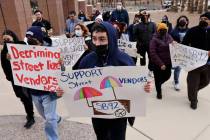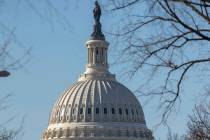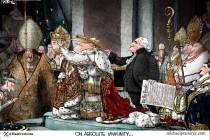If it shouldn’t be public, the court shouldn’t ask
There’s a method to our madness.
And it is not because we want to pry into the personal lives of potential jurors.
When the judge in O.J. Simpson’s kidnapping and robbery trial denied access to jury questionnaires, the Review-Journal and The Associated Press filed suit. On Christmas Eve, the state Supreme Court ruled in our favor.
Since then, a couple of letter writers have taken us to task for daring to seek access to the very private and personal information revealed in the answers to those questionnaires.
After all, why should everyone be allowed to know the answers to these questions that were actually asked of the O.J. jurors:
"Who is your favorite public person?"
"If you read a newspaper, which section do you read first?"
"Have you ever had a problem with alcohol or drug use?"
"Have you, any of your family members or close friends ever had any training or education in any aspect of the law or been employed in any aspect of the legal field?"
"Have you, your spouse or domestic partner, or any family members, friends or co-workers ever belonged, donated money to, signed a petition for, or other wise supported an advocacy group(s) for civil liberties, people accused of crimes or people who are in prison, e.g., American Civil Liberties Union, Amnesty International, etc.?"
"Have you ever had an unpleasant experience with any type of law enforcement officer?"
"Will you follow the law, as given to you by the court, even though it may differ from your concept of what the law should be?"
And on and on and on for 116 questions, most with space left for "Please explain."
Here is the problem: Private information placed in the hands of a public agency or a public official is an oxymoron — a locution of terms that are contradictory or incongruous, like old news, peace force, near miss, larger half, unbiased opinion.
The Sixth Amendment guarantees "the accused shall enjoy the right to a speedy and public trial, by an impartial jury … ." A public trial includes the voir dire process of seating the jury. Secret jurors or secret questions do not constitute a public trial.
Writing for the court, Chief Justice James Hardesty clearly spelled this out, first noting that the public and the press have a right to intervene in cases to assert their First Amendment rights.
He then wrote, "We further conclude that juror questionnaires used in jury selection are, like the jury-selection process itself, presumptively subject to public disclosure.
"The presumption of openness may be overcome, however, only if the district court identifies a countervailing interest to public access and demonstrates, by specific findings, that closure is necessary and narrowly tailored to serve a higher interest."
Judge Jackie Glass failed to do so. She simply promised the jurors their answers would be private. Such a promise is without any legal standing.
Hardesty quoted from a couple of famous cases out of California that spell out how "sensitive questions" may be handled in secret on an individual basis.
The solution to the public-private conundrum is simple. No juror should ever be required to answer irrelevant, personal questions about their private lives. It is none of the court’s or lawyers’ concern.
These juror questionnaires have turned into a tool for jury stacking and tampering by the attorneys. They are used to psychologically profile jurors to the advantage of the state or the defense. Are left-handed redheads more likely to convict?
Potential jurors should be asked only three questions under oath:
1. Are you a citizen of the United States?
2. Are you a convicted felon?
3. Considering the parties and the nature of this case, is there anything that might prevent you from rendering a fair and impartial verdict based on the evidence presented and the applicable law as you interpret it?
(We’ll quibble over the concept of jury nullification another day, judge.)
The courts, the executive and legislative branches exist to carry out the will of citizens, and these citizens cannot hold these institutions accountable if they are denied the ability to view how their business is conducted.
Public information is public. Private information is private. And never the twain should meet.
If it is in the hands of a public agency, it ain’t private, by definition.
Thomas Mitchell is editor of the Review-Journal and writes about the role of the press, access to public information and the First Amendment. He may be contacted at 383-0261 or via e-mail at tmitchell@ reviewjournal.com. Read his blog at lvrj.com/blogs/mitchell.


















